
A namespace is a separate scope for variables, functions, and types to prevent overwriting of variables and functions or preventing name conflicts. Namespacing is the practice of creating an object which encapsulates functions and variables that have the same name as those declared in the global scope.
A basic but necessary concept.
In fact, if scope didn't exist then programming itself would not be scalable at all. Let's say we're writing a program that uses some other library that's going to make what we're doing much easier. This could be anything, from a library that does advanced mathematical functions like physics or a full-on gaming engine like Unreal.
If that library declares a variable called distance for example, how does the computer know the difference between that variable and another variable named distance within our own script? The answer is that these two variables exist in a completely different scope. In fact when the computer compiles all the information into actual runnable code it has no idea that either of these two variables was ever called distance in the first place. It just throws it into a completely human-unreadable address consisting of 1's and 0's machine code. As long as the complier knows the difference and puts the two variables in different places then it's all good.

Some JavaScript examples.
JavaScript is a much looser and forgiving language then something strict like C++. In JavaScript functions have access to variables globally by default, while in C++ a function only has access to exactly what we say it has access to.
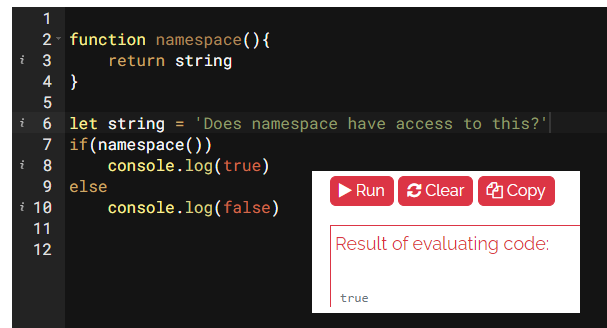
Overwriting variables
What would happen if we tried to create a new string inside of namespace()
Would that work or throw an error?
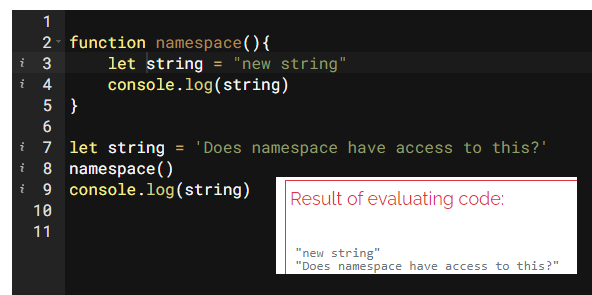
Scope hard at work here.
So now we have a variable named string that exists globally and a variable named string that exists only within the function. They have completely different values. This also means that the function no longer has access to the global variable because it's been overwritten.
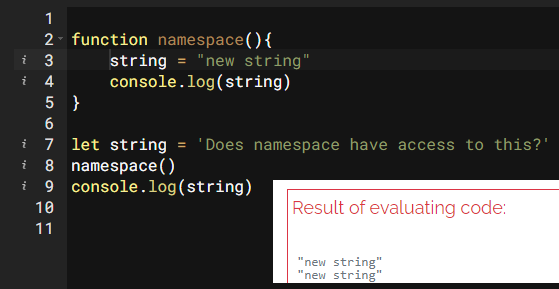
What happens if we don't declare string a second time?
Here we have the exact same code except I removed the variable declaration let from the function. Now there is only one string instead of two. The first one gets thrown to garbage collection when it gets overwritten by the second.
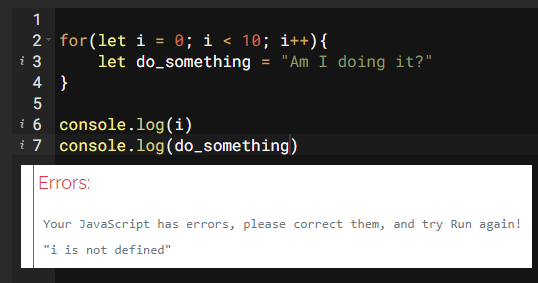
let vs var
JavaScript was officially first invented in 1995 but the let declaration didn't exist until twenty years later in 2015. They both do basically the same thing (declare a variable), but let has a limited scope and kills off variables much sooner than var does. It is considered good practice to use let when the extra scope given by var is unnecessary. However, many programmers just use var for everything because that's the way they learned JavaScript and that's how most of the tutorials and StackOverflow answers are written.
In the above example I used let to declare variables i and do_something within a for-loop. Then I tried to access these variables outside of the for-loop. This is not allowed... because apparently even loops and if-statements have their own scope in which let cannot escape. Both these variables get destroyed by their lack of scope by the time I go to access them on the next line.
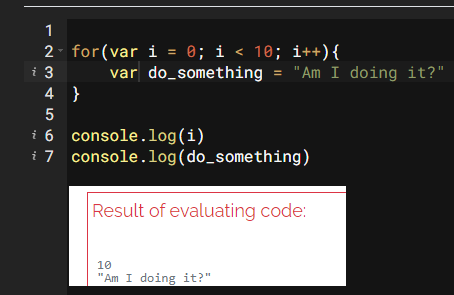
All I have to do is rewrite the let as var and we can see that var breaks out of this scope to become a global variable, which I can then access outside of the loop. Again it is considered good practice to not do this unless this is specifically what the programmer was going for. For example we might make a mistake later and start accessing the variable i thinking it's something else when it's actually 10 because of this loop. This could create a bug that takes longer to fix than if it had just thrown an error because i was never declared in the first place due to the lack of scope. Tiny errors like this can explode into a lot of wasted time debugging things that will feel absolutely idiotic in retrospect.

Hierarchy of scope.
We would think that global variables would be at the top of the food chain in terms of scope, but that's actually not true. There is one level even above global which is the built in reserved words. These are words like let, var, const, undefined, null, function, etc. You aren't allowed to use these names except for their intended purpose. We can't create a function called function, nor would we want to because it would just be terrible and confusing.
- Rank 0: built-in reserved scope.
- Rank 1: global scope.
- Rank 2: functions, classes, and libraries.
- Rank 3+: nested functions, classes, and libraries.
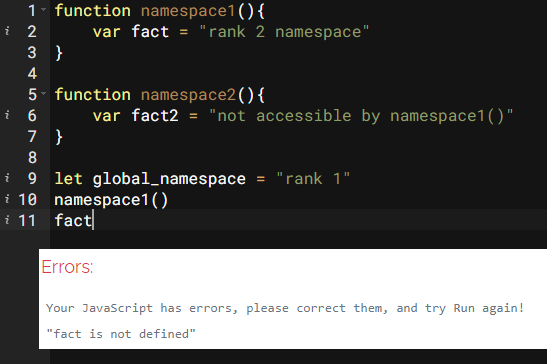
As we can see from this test the var declaration may be strong enough to break out of for-loop and if-statement scopes but it is not strong enough to break out of functions or classes. Even though we ran function namespace1() and var fact was created it got destroyed again as soon as the function popped off the stack; throwing an error when trying to access it globally after the fact. However, as I have already shown previously if we had simply declared fact globally in the first place instead of within the function: this test would have worked as intended.
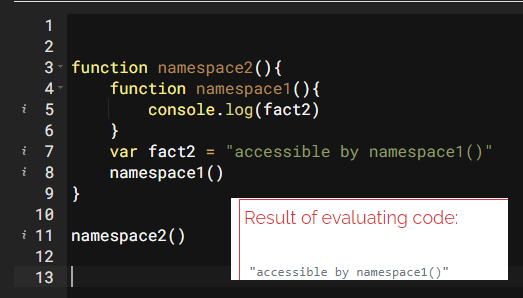
Nested functions
One advantage of putting a function inside of another function is that this child function has access to the scope of the parent. In this example namespace1() gains access to all the variables declared in namespace2() and is able to modify variables that it couldn't before when both were separated rank 2 functions within the global scope. The rule of thumb here being that the child tends to inherit all the traits of the parent but the children do not inherit traits from each other.
Conclusion
Scope is one of those subjects in programming that one can totally ignore as a novice; Just hack away at the code until it works like we want it to work. This is one of those topics that needs to be understood at the higher levels to reduce bugs and to create more modular products that fit together in a scalable way without creating the dreaded spaghetti factory solution that just ends up being a tangled mess that is guaranteed to break if we change anything.
If used correctly and with thoughtful intent, scope is a very powerful tool and necessary component of object oriented programing that allows us to keep building without previous builds getting in the way of what we're currently trying to achieve.
One that I think people stumble on especially hard is assignment. ('=' is not 'equals')
Programming is a weird beast. These days I feel like my biggest problem is remembering syntax. Every language is more or less the same kind of basic structure.
Have you started looking into data structures and algorithms yet?
This is something going above my head.
I know 😅
xD
Sounds like you are getting ready to do some serious dev work :)... I hope it's something fun 🙌
This post has been manually curated by the VYB curation project
Yep I think I just need to commit to a super small project that actually works and just get it done.
Thinking about something SUPER BASIC like... building the Battleship boardgame on Hive.
Except we'd all be able to bet on the outcome because crypto :D.
Gambling AND board games? You're aiming at two of my vices. 😂
Hey, on a completely different topic... do you know why people buy the amount of $HIVE that they do? Like, I know dApps need resource credits, and people might buy it to power up, but I'm trying to figure out if there is any reason to think that demand will outpace supply over time... or if it's all just random crypto fun?
Well the first question you've got to ask is how much supply there is in the first place.
Our inflation schedule started at 10% a year and plans to go to 1% a year.
Right now I think we are at something like 7%.
Do you think Hive can grow 7% a year on average?
If it can that supply can be outpaced by demand.
There's also HBD inflation which is separate.
Can HBD demand go up more than the 20% yield?
And finally there is @hive.fund proposal money which is paying developers thousands a day to create and maintain stuff on the blockchain. Is this expenditure worth it? Debatable. How much are these thousands a day compared to the 7% Hive inflation? At the current USD price 7% a year on a $130M cap is something like $25k a day, so perhaps the @hive.fund money isn't as big a drain as it seems on a relative scale... but this is also ninjamine money so there are politics involved with that.
Looking at the actual price action of our token over multiple cycles we can see that demand outpaces supply all the time. Being bored or annoyed that our number crabs while other numbers are going up is the real issue imo. Hive always lags, then it pumps hard, then it bleeds slow.
I honestly don't think this is an appropriate question to ask until Hive has traded flat for an entire 4-year cycle... and even then that's not even a bad thing as it shows we are still profitable and stable. Suddenly being worried that Hive is going to stop being volatile and flatline forever right before 2025 is probably just another reason to double down and buy more. Just like 2020 this is the kind of bet that can take 6-12 months to actually pay out.
Thanks!
I'm not actually worried about the next year or two... I'm mainly trying to get my head around Hive over the next decade or two... but maybe that's a ridiculous thought-process because of all the unknowable variables.
I guess the question with the @hive.fund is if that spigot was turned off, would $HIVE lose value? Possibly again unknowable because Steem/Hive has never not had development.
Hive pumping hard has always seemed like market speculation to me rather than an intense need for the tokens... but yeah, happy to wait out the cycles to see the overall trends. Hive isn't costing me anything but time and effort and I've enjoyed it so far.
This is beyond me but I wish you well
I’ve made some findings about coding and I heard it isn’t easy so I wish you well
Thanks for your contribution to the STEMsocial community. Feel free to join us on discord to get to know the rest of us!
Please consider delegating to the @stemsocial account (85% of the curation rewards are returned).
You may also include @stemsocial as a beneficiary of the rewards of this post to get a stronger support.